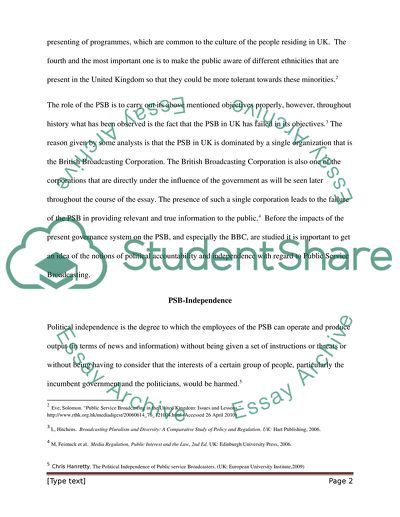Cite this document
(“UK Public Service Broadcasters Assignment Example | Topics and Well Written Essays - 3500 words”, n.d.)
UK Public Service Broadcasters Assignment Example | Topics and Well Written Essays - 3500 words. Retrieved from https://studentshare.org/media/1736749-public-service-broadcasters-are-expected-to-be-both-politically-independent-and-politically-accountablecritically-examine-how-regulators-in-the-uk-have-tried-to-resolve-the-tension-between-these-two-normative-expectationsand-how-successfully-they-have
UK Public Service Broadcasters Assignment Example | Topics and Well Written Essays - 3500 words. Retrieved from https://studentshare.org/media/1736749-public-service-broadcasters-are-expected-to-be-both-politically-independent-and-politically-accountablecritically-examine-how-regulators-in-the-uk-have-tried-to-resolve-the-tension-between-these-two-normative-expectationsand-how-successfully-they-have
(UK Public Service Broadcasters Assignment Example | Topics and Well Written Essays - 3500 Words)
UK Public Service Broadcasters Assignment Example | Topics and Well Written Essays - 3500 Words. https://studentshare.org/media/1736749-public-service-broadcasters-are-expected-to-be-both-politically-independent-and-politically-accountablecritically-examine-how-regulators-in-the-uk-have-tried-to-resolve-the-tension-between-these-two-normative-expectationsand-how-successfully-they-have.
UK Public Service Broadcasters Assignment Example | Topics and Well Written Essays - 3500 Words. https://studentshare.org/media/1736749-public-service-broadcasters-are-expected-to-be-both-politically-independent-and-politically-accountablecritically-examine-how-regulators-in-the-uk-have-tried-to-resolve-the-tension-between-these-two-normative-expectationsand-how-successfully-they-have.
“UK Public Service Broadcasters Assignment Example | Topics and Well Written Essays - 3500 Words”, n.d. https://studentshare.org/media/1736749-public-service-broadcasters-are-expected-to-be-both-politically-independent-and-politically-accountablecritically-examine-how-regulators-in-the-uk-have-tried-to-resolve-the-tension-between-these-two-normative-expectationsand-how-successfully-they-have.


